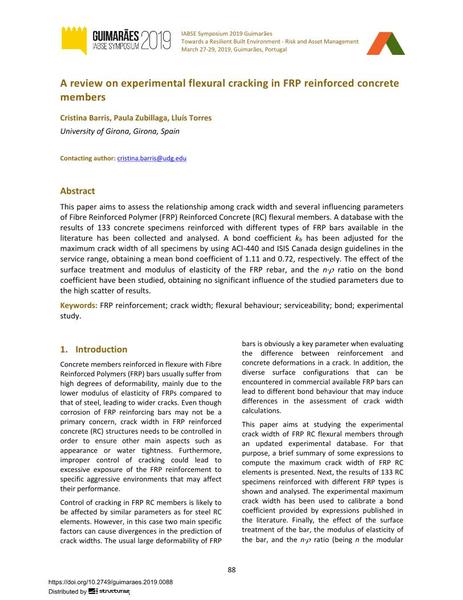A review on experimental flexural cracking in FRP reinforced concrete members

|
|
|||||||||||
Bibliographic Details
| Author(s): |
Cristina Barris
(University of Girona, Girona, Spain)
Paula Zubillaga (University of Girona, Girona, Spain) Lluis Torres (University of Girona, Girona, Spain) |
||||
|---|---|---|---|---|---|
| Medium: | conference paper | ||||
| Language(s): | English | ||||
| Conference: | IABSE Symposium: Towards a Resilient Built Environment Risk and Asset Management, Guimarães, Portugal, 27-29 March 2019 | ||||
| Published in: | IABSE Symposium Guimarães 2019 | ||||
|
|||||
| Page(s): | 88-95 | ||||
| Total no. of pages: | 8 | ||||
| DOI: | 10.2749/guimaraes.2019.0088 | ||||
| Abstract: |
This paper aims to assess the relationship among crack width and several influencing parameters of Fibre Reinforced Polymer (FRP) Reinforced Concrete (RC) flexural members. A database with the results of 133 concrete specimens reinforced with different types of FRP bars available in the literature has been collected and analysed. A bond coefficientkb has been adjusted for the maximum crack width of all specimens by using ACI-440 and ISIS Canada design guidelines in the service range, obtaining a mean bond coefficient of 1.11 and 0.72, respectively. The effect of the surface treatment and modulus of elasticity of the FRP rebar, and then· ratio on the bond coefficient have been studied, obtaining no significant influence of the studied parameters due to the high scatter of results. |
||||
| Keywords: |
bond serviceability crack width flexural behaviour experimental study FRP reinforcement
|
||||
